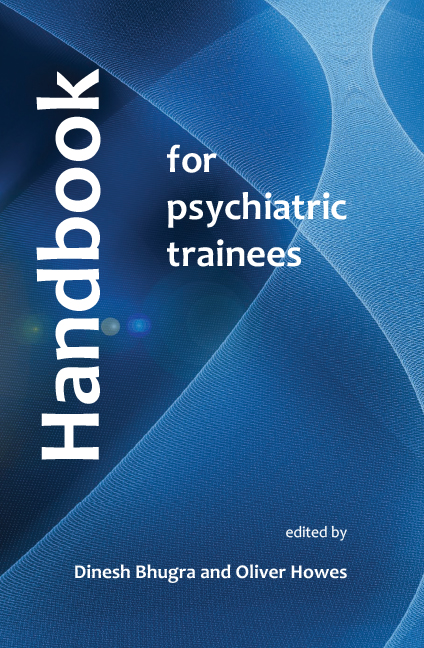Book contents
- Frontmatter
- Contents
- List of tables, boxes and figures
- List of contributors
- 1 Psychiatric training: the next steps
- Part 1
- Part 2
- Part 3
- 14 Personal safety
- 15 Managing violence
- 16 Managing difficult clinical situations
- 17 Understanding and managing stress
- 18 Managing time: the key to professional success
- 19 Negotiation skills
- 20 Presentation skills
- 21 Mental health review tribunals: reports and hearings
- 22 How to get published
- 23 Mental health informatics
- 24 Clinical governance
- 25 Lifelong learning and revalidation
- 26 Mentoring and shadowing
- 27 The MRCPsych examinations
- 28 Flexible training
- 29 UK training for overseas doctors and opportunities for UK doctors to train outside the EEC
- 30 Academic careers
- 31 Higher degrees
- Index
28 - Flexible training
from Part 3
- Frontmatter
- Contents
- List of tables, boxes and figures
- List of contributors
- 1 Psychiatric training: the next steps
- Part 1
- Part 2
- Part 3
- 14 Personal safety
- 15 Managing violence
- 16 Managing difficult clinical situations
- 17 Understanding and managing stress
- 18 Managing time: the key to professional success
- 19 Negotiation skills
- 20 Presentation skills
- 21 Mental health review tribunals: reports and hearings
- 22 How to get published
- 23 Mental health informatics
- 24 Clinical governance
- 25 Lifelong learning and revalidation
- 26 Mentoring and shadowing
- 27 The MRCPsych examinations
- 28 Flexible training
- 29 UK training for overseas doctors and opportunities for UK doctors to train outside the EEC
- 30 Academic careers
- 31 Higher degrees
- Index
Summary
Psychiatry has been at the forefront of flexible training since the introduction of the scheme to the National Health Service (NHS) in 1969. Indeed, the origins of flexible training in psychiatry pre-date the formal NHS scheme, as psychiatrists were training on a part-time basis in Oxford as early as 1966 (Department of Health, 1991). This chapter charts the historical background of flexible training in the UK. The roles of the postgraduate deaneries and the Royal College of Psychiatrists are discussed, and a ‘rough guide’ to flexible training is presented.
Historical background
1969–1991
Flexible training was introduced to the NHS in 1969 with the HM(69)6 notice, and aimed specifically at women with domestic commitments (Department of Health, 1969). It was not seen as a mainstream career pathway, and apart from some posts established in Oxford, the scheme was little used in other regions until 1979, when the PM(79)3 scheme was introduced, specifically focused on senior registrar grades (Department of Health, 1979). The 1979 Department of Health memorandum reflected the Equal Opportunities Act 1974, the increase in the number of women doctors graduating and the increase in the number of women in the workforce (Goldberg & Maingay, 1997). It also focused on the need for part-time trainees to be of similar calibre to full-time trainees and to ensure that the training posts they occupied had educational approval from the appropriate medical Royal College. Regions were allowed to set up flexible posts at other grades at their own discretion (Clay, 1998). Candidates had to show ‘well-founded personal reasons’ to train flexibly and senior registrars had to enter a national competition to get ‘manpower approval’ (Clay, 1998). Successful candidates then had to find a local post with educational approval, obtain funding and finally satisfy a local appointments committee (Department of Health, 1991). Funding was not readily available and there was an average delay of 18 months between application and taking up a post (NHS Management Executive, 1993). Although bureaucratic and slow, this scheme allowed more doctors to complete higher specialist training (Scriven, 1996). The report of the Joint Working Party on women doctors and their careers commented on the cumbersome nature of the scheme and called for a review of procedures (Department of Health, 1991).
- Type
- Chapter
- Information
- Handbook for Psychiatric Trainees , pp. 286 - 301Publisher: Royal College of PsychiatristsPrint publication year: 2008



